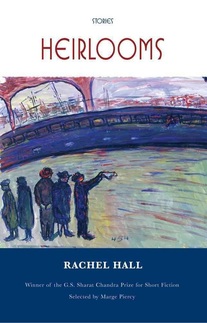| Title: Heirlooms Author: Rachel Hall Publisher: BkMk Press of the University of Missouri-Kansas City, September 2016 Where can you get it? If not your local bookstore, here is the link to BkMk's order page. Price: $15.95 -- the perfect price for a nice Christmas gift, equivalent to two Chipotle burritos, which are so fleeting... |
Heirlooms begins in Saint-Malo, in 1940: a focal character, Lise, becomes guardian to her baby niece after her sister-in-law dies. From here, Rachel zooms into the lives that constellate around Lise and the baby Eugenie. Everyone is influenced by the War; all are insulated and also connected by their losses. Even for the people who betray Lise in some way, Rachel slips in the most subtle details to illustrate parallels. One woman who appears briefly, Sylvie, at first seems antithetical to conscientious Lise when she refuses to help Lise's hungry family, but the reader will soon see their parallels, right down to their knitting projects.
Rachel's care for details is something I appreciate most. They culminate into these beautiful moments of significance that have stuck with me -- which is what writing is supposed to do, keep coming back to you. I'm restraining my desire to analyze this too much here because I don't want to spoil anything for readers, but I will point out one example: later in the book, we learn Eugenie is a breast cancer survivor. Though Rachel does not belabor this episode, I believe she includes this detail for a sincere reason. While traveling in Paris decades after the War, a friendly German couple at a restaurant invites Eugenie to pull up a chair and offers her a glass of wine. Eugenie sizes them up, as we often do with new people, determining that they are "Younger than she, too young to have known the war in which she was the enemy, but what of their parents and grandparents?" Though Eugenie quickly moves on from this thought, it shook me. What explosive irony! How humans betray each other, delivering the greatest havoc and torment imaginable, and future generations can sit next to each other, sharing wine. The German woman is also a breast cancer survivor, and Eugenie, who is usually so guarded about her pain like everyone around her, connects with her on that profound level.
Many of the people in these stories hold their pain so secretively, as if it is theirs and theirs alone, as if pain were not a common thread in humanity. This truth makes it all the more poignant when they take care of each other, lift each other with the deepest sense of empathy, albeit silently. This theme comes full circle in the last few stories and with stark contrast: readers are introduced to a group of people from a younger generation, mourning very publicly on Eugenie's front lawn, to her discontent. Heirlooms is rich with these nuances.
From Europe to the United States, the stories trace the generations of a family fragmented by war -- struggling, after leaving everything behind, to maintain parts of themselves, of who they were. Within this, there are wonderful, uplifting tales of success and triumph. While there are a lot of books out there that reflect on the damage of World War II and the Holocaust, Heirlooms stands out because it examines the ripple effect on future generations. It is not simply an earnest, well-researched narrative; it breathes. It's immersive. It is careful yet honest, and therefore it does not force meaning on the reader. It is beautiful.

 RSS Feed
RSS Feed